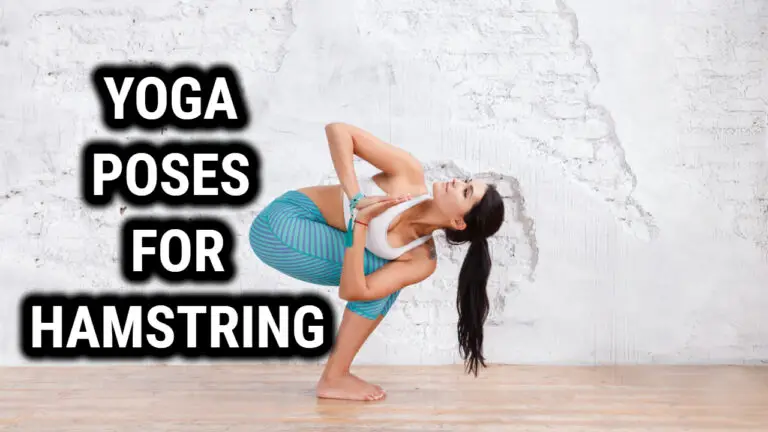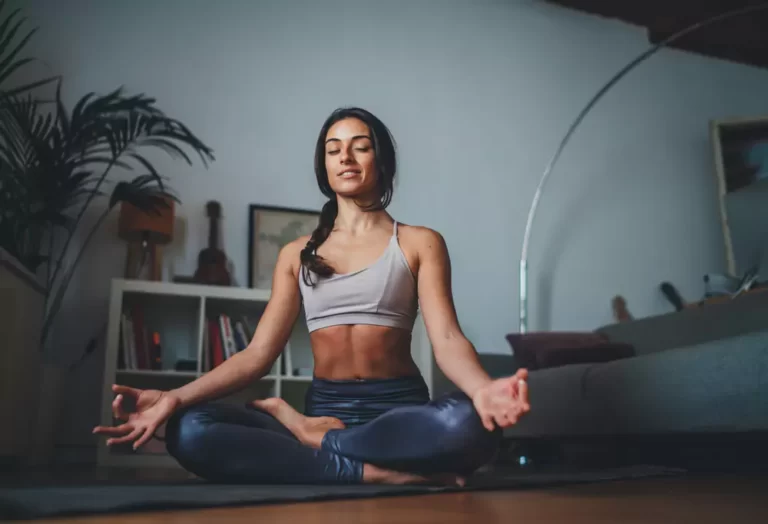Why Is Yoga Good For You Mentally?

Yoga has become increasingly popular in recent years, and for good reason! Not only is it a great way to get fit and stay healthy, but it can also be incredibly beneficial for your mental health.
Here, we’ll explore the reasons why yoga is so good for you mentally, from helping your concentration and focus to reducing stress and anxiety. So if you’re looking for ways to improve your mental wellbeing, look no further than yoga!
Yoga is an ancient practice that’s been around for centuries. It’s all about physical postures and breathing exercises that help restore balance in both the body and mind. When done regularly, it can have a positive effect on both your physical and mental health.
So why exactly is yoga so good for you mentally? Read on to find out more!
Stress Relief
Yoga is an excellent way to relieve stress. It not only helps you manage your stress in the moment, but it can also help build resilience to cope with future stressors.
Practicing yoga can reduce the physical effects of chronic stress, such as increased blood pressure and heart rate, as well as reduce psychological symptoms like anxiety and depression.
Yoga encourages mindfulness and body awareness, which can help you recognize when your body is under stress so that you can react to it in healthy ways.
Yoga also provides a great opportunity for self-care and reflection. Taking time for yourself helps to create balance in your life and gives you a chance to reconnect with yourself and let go of unnecessary stress or worries.
Practicing mindful breathing exercises or meditating during yoga can further improve mental wellbeing by calming the mind and quieting mental chatter that can lead to feelings of overwhelm or agitation.
By taking care of our minds through yoga practice, we are better able to take care of ourselves overall and find more peace in our lives.
Increased Mindfulness
Yoga is a great practice for improving mental wellbeing because it encourages mindfulness. By focusing on the body and breath in yoga poses, practitioners learn to pay attention to the present moment without judgment.
This increased awareness can lead to improved concentration and better decision making capabilities. Yoga helps bring clarity of mind by allowing practitioners to let go of physical and mental tensions that can cloud the judgement.
They become more aware of their emotions and feelings, leading to an improved sense of self-awareness. Practicing yoga provides an opportunity to connect with one’s inner world, allowing them to find peace and balance within themselves.
As a result, individuals become more resilient in the face of life’s challenges and gain greater control over their reactions as they learn how to stay grounded in difficult times. With regular practice, yoga can make individuals feel calmer and more secure – both mentally and emotionally.
Improved Focus And Concentration
Yoga, can help improve focus and concentration. When practicing yoga, it is important to stay mindful of the breath and be aware of the body’s movements. This encourages better concentration and promotes focus on the present moment.
The practice of yoga helps build mental strength and clarity while improving overall cognitive function. It allows individuals to develop steadier breathing patterns which in turn improves attention span and decreases stress levels.
Here are some additional benefits:
Physical:
- Increased flexibility
- Strengthened muscles
Mental:
- Improved motivation
- Reduced anxiety
Yoga helps cultivate a sense of mindfulness that is invaluable for overall wellbeing. Through yoga, an individual can learn how to quiet their mind and focus on the present moment without being distracted by thoughts about the past or future. This type of mental clarity can help reduce stress levels, leading to more productive days both mentally and physically.
Improved Self-Confidence
Yoga provides many mental health benefits, including improved self-confidence. With regular practice, not only can yoga increase the feeling of confidence in yourself and your abilities, it can also reduce anxiety and boost positive feelings.
| Benefits of Yoga | Ways to Achieve It |
|---|---|
| Increased Self-Confidence | Regular Practice |
| Reduced Anxiety | Engaging with Others in Class |
| Boosted Positive Feelings | Learning New Poses & Techniques |
| Improved Concentration & Focus | Deep Breathing Exercises & Meditation |
| Enhanced Creativity & Problem Solving Skills | Allowing Yourself to Let Go & Have Fun! |
The physical and mental challenges that come along with practicing yoga can help you push through self-doubt and find a sense of accomplishment. When you learn new poses or techniques, become aware of your breath, or try something out of your comfort zone, it can give you an incredible sense of self-empowerment.
What’s more, engaging with other yogis and forming a connection in class may help you discover a new level of confidence and acceptance within yourself. By making yoga part of your regular routine, you will be able to reap its full benefits both physically and mentally.
Increased Emotional Resilience
Coincidentally, yoga can also provide tremendous mental benefits. Practicing yoga not only helps to improve self-confidence, but it can also increase emotional resilience.
By focusing on breathing and releasing tension in the body, yoga helps to cultivate a sense of calmness that can help us better manage our stressful emotions. It encourages mindfulness in order to process our feelings and respond to them in healthier ways rather than reacting impulsively.
Learning to recognize our own thoughts and feelings, as well as being able to maintain an awareness of the present moment, are key components of emotional resilience that yoga can help foster. With this greater resilience comes an ability to cope with difficult situations more effectively and a stronger capacity for empathy towards others.
The Mind-Body Connection In Yoga
Yoga is a practice that emphasizes the connection between the mind and body. It is designed to promote physical strength, flexibility, and balance while also calming the mind and reducing stress. This mind-body connection is achieved through a combination of breathing techniques, meditation, and mindfulness.
Breathing Techniques
Breathing techniques, or pranayama, are an essential part of yoga practice. They help to calm the mind, reduce stress, and increase focus. In yoga, the breath is seen as a bridge between the body and the mind, and by controlling the breath, practitioners can achieve a state of balance and harmony.
There are several different breathing techniques used in yoga, each with its own benefits. Some, like Ujjayi breath, involve deep, slow breathing through the nose, while others, like Kapalabhati breath, involve short, sharp exhales through the nose.
Meditation
Meditation is another important aspect of yoga practice. It involves sitting quietly and focusing the mind on a specific object, sound, or thought. Meditation has been shown to reduce stress, improve concentration, and promote a sense of calm and well-being.
In yoga, meditation is often combined with breathing techniques to help practitioners achieve a deeper state of relaxation and focus. Some yoga classes may also include guided meditations, where the teacher leads students through a series of visualizations or affirmations to promote relaxation and positive thinking.
Frequently Asked Questions
What Types Of Yoga Are Best For Mental Health?
Yoga is an excellent way to promote mental health and well-being.
There are many different types of yoga that can be beneficial for mental health, depending on what you’re looking for.
Hatha yoga helps to improve focus and concentration, while restorative and yin yoga can help to reduce stress and anxiety.
Kundalini yoga is great for calming the mind and clearing out negative thoughts.
Vinyasa flow classes provide more of a physical challenge, while meditative yoga can help cultivate mindfulness.
Regardless of what type of yoga you choose, it can be incredibly helpful in improving your mental health.
How Much Yoga Do I Need To Do To See Mental Health Benefits?
The amount of yoga needed to see mental health benefits varies depending on the individual, but regular practice is recommended.
Doing at least 20 minutes of yoga a few times per week can help reduce stress, improve concentration and mood, and increase self-awareness.
Consistency and making it part of your lifestyle are key for long-term benefits.
It’s important to choose a type of yoga that works best for you and that you enjoy so that you’re more likely to stick with it.
Can Yoga Help With Depression Or Anxiety?
Yes, yoga can be very beneficial for those struggling with depression or anxiety.
Practicing yoga regularly has been known to reduce stress and increase feelings of peace and wellbeing, while improving physical and mental health.
It can help to reduce tension in the body and mind, while calming the nervous system and increasing self-awareness.
Additionally, yoga can also improve sleep quality, which is key for managing depression and anxiety.
Is It Necessary To Practice Yoga In A Studio Or Can I Do It At Home?
Wouldn’t it be nice to practice yoga in the comfort of your own home without the pressure of a studio environment?
Ironically, while a studio setting can offer valuable guidance and support, it’s not necessary to reap the mental benefits of yoga.
In fact, you might even find that practicing at home can feel more rewarding and less intimidating!
With some basic knowledge and a comfortable space, you’ll be able to experience all of the mental health perks that come with regular yoga practice – no studio required.
Conclusion
Yoga is like a journey, it can take you to a place of peace and clarity. Practicing yoga can help improve mental wellbeing and bring balance to your life.
It’s important to find the right style of yoga that works best for you, as well as determine how much practice is necessary.
Whether you choose to practice in a studio or at home, yoga can provide immense amounts of benefit for your mind, body and spirit.
So take the time to explore this ancient art form and discover for yourself the power of yoga.





